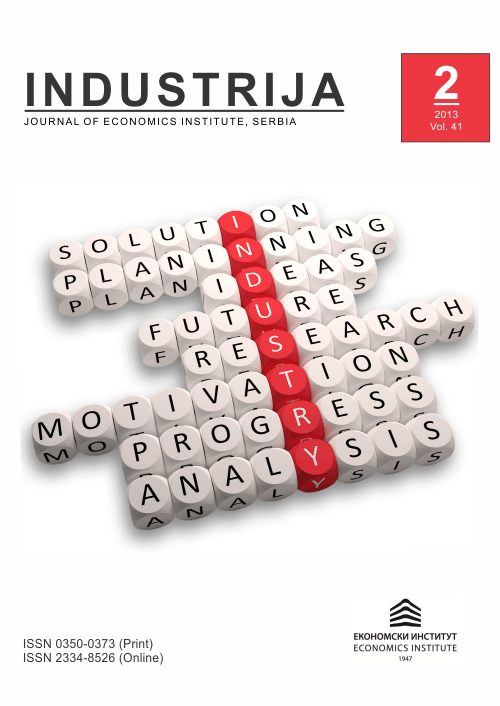Uticaj unapređenja ekonomije znanja na konkurentnost zemalja Jugoistočne evrope
Sažetak
Svrha ovog rada je da istraži uticaj znanja kao vitalnog razvojnog resursa na konkurentnost zemalja jugoistočne Evrope. Cilj rada je da se odgovarajućom metodologijom identifikuje povezanost dostignutog stepena razvoja ekonomije znanja merenog pomoću KEI (Knowledge Economy Index) u zemljama jugoistočne Evrope sa nivoom njihove konkurentnosti merene pomoću GCI (Global Competitiveness Index). Istraživanje se realizuje primenom metoda deskriptivne statistike, korelacione, regresione i komparativne analize. Rad je strukturiran iz sledećih segmenata: analiza konkurentnosti zemalja jugoistočne Evrope na osnovu GCI i KEI, kao i pilara u okviru KEI, ispitivanje međuzavisnosti GCI i KEI i ispitivanje uticaja pilara u okviru KEI na GCI u zemljama jugoistočne Evrope. Rezultati istraživanja ukazuju na postojanje slabe pozitivne korelacije između GCI i KEI. Takođe, dobijeni rezultati upućuju na preporuke kreatorima politika razvoja u zemljama jugoistočne Evrope.
Reference
Andriessen, D. (2004). Making Sense of Intellectual Capital – Designing a Method for Valuation of Intangibles. Burlington: Elsevier Butterworth-Heinemann.
Bedford, A. D. (2013). Expanding the Definition and Measurement of Knowledge Economy: Integrating Triple Bottom Line Factors into Knowledge Economy Index Models and Methodologies. Journal of Modern Accounting and Auditing, 9(2), 278-286.
Bratianu, C., & Dinca, V. (2010). Knowledge Economy Dimensions, Review of International Comparative Management, 11(2), 210 – 220.
Brinkley, I. (2006). Defining the Knowledge Economy, London: The Work Foundation.
Chen D., Dahlman C. (2005). The Knowledge Economy, the KAM Methodology and World Bank Operations. World Bank Institute Working Paper No. 37256. Retrieved from http://ssrn.com/abstract=641625 (17.04.2013)
Daniels, J., Radebaugh, L., & Sullivan D. (2002). Globalization and Business. New Jersey: Prentice Hall.
Department of Commerce (DOC), Advisory Committee on Measuring Innovation in the 21st Century Economy. Innovation Measurement: Tracking the State of Innovation in the American Economy. Report to the Secretary of Commerce. Retrieved from http//www.esa.doc.gov/Reports/innovation-measurement-tracking-state-innovation-america-economy (20.04.2013)
Donaldson B., & O' Toole T. (2002). Strategic Market Relationships – From Strategy to Implementation, New York: John Wiley & Sons, Ltd.
Drucker, P. (1992). The Age of Discontinuity – Guidelines to Our Changing Society. New Brunswick: Transaction Publishers.
Foray, D. (2004). The Economics of Knowledge, Cambridge: MIT Press.
Javalgi, G. R., Gross, C. A., Benoy, W. J., Granot, E. (2011). Assessing competitive advantage of emerging markets in knowledge intensive business services. Journal of Business & Industrial Marketing, 26(3), 171–180.
OECD. (1996). The Knowledge-Based Economy. Paris: OECD. Retrieved from http://www.oecd.org/science/sci-tech/1913021.pdf (01.05.2013)
OECD. (2012). New Sources of Growth, Knowledge – Based Capital Driving Investment and Productivity in the 21st Century. Paris: OECD. Retrieved from http://www.oecd.org/sti/50498841.pdf (02.04.2013)
Peters A. M. (2010). Three Forms of the Knowledge Economy: Learning, Creativity and Openness. British Journal of Educational Studies, 58(1), 67 – 88.
Powell, W., & Snellman, K. (2004). The Knowledge Economy. Annual Review of Sociology, 30, 199-220.
Teece, D. J. (2000). Managing Intellectual Capital. Oxford: Oxford University Press.
The Word Economic Forum. (2013). The Global Competitiveness Reports 2012 – 2013. Retrieved from http://www3.weforum.org/docs/WEF_GlobalCompetitivenessReport_2012-13.pdf (15.04.2013)
The World Bank. (2012). Knowledge Economy Index (KEI) 2012 Rankings. Retrieved from http://siteresources.worldbank.org/INTUNIKAM/Resources/2012.pdf (01.05.2013)
The World Bank. Retrieved from http://info.worldbank.org/etools/kam2/KAM_page5.asp (31.04.2013)
Thissen R., Andriesen D., & Deprez Lekanne F. (1999). Creating High – performance Companies trough Value – based Knowledge Management THE KNOWLEDGE DIVIDEND. London: Pearson Education Limited.
Watkins, T., & Yandle, B. (2010). Can Freedom and Knowledge Economy Indexes Explain Go-Getter Migration Patterns? The Journal of Regional Analysis and Policy, 40(2), 104-115.
Wickham A. P. (2001). Strategic Entrepreneurship – A Decision-Making Approach to New Venture Creation and Management. London: Pearson Education Limited.
World Bank Institute. (2004). Benchmarking Countries in the knowledge economy: Presentation of the Knowledge Assessment Methodology (KAM), Knowledge for development program. Retrieved from http://siteresources.worldbank.org/KFDLP/Resources/KAMBoardBriefing.pdf (25.04.2013)
Zitek, V., & Klimova, V. (2011, August). Knowledge economy and Knowledge Infrastructure, Paper presented at the International Conference on Applied Economics, Italy. Retrieved from http://kastoria.teikoz.gr/icoae2/wordpress/wp-content/uploads/2011/10/084.pdf

